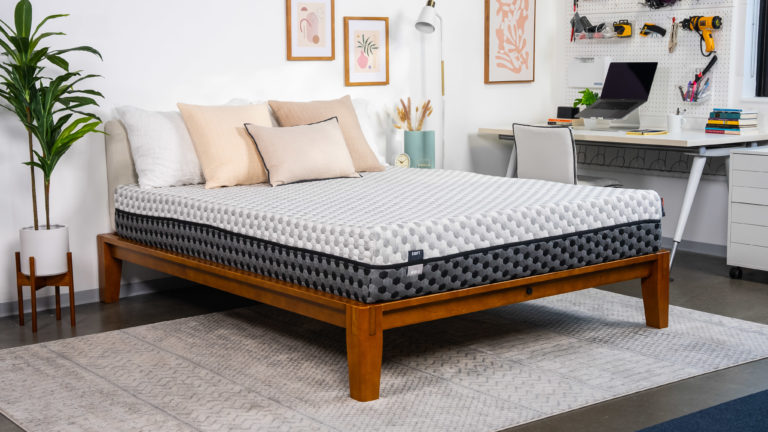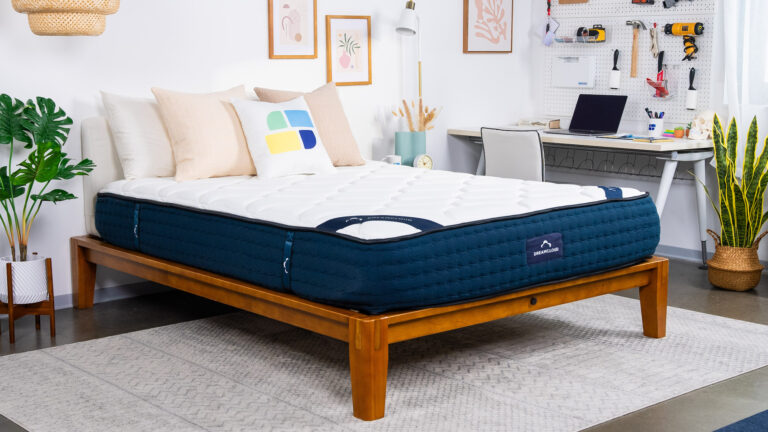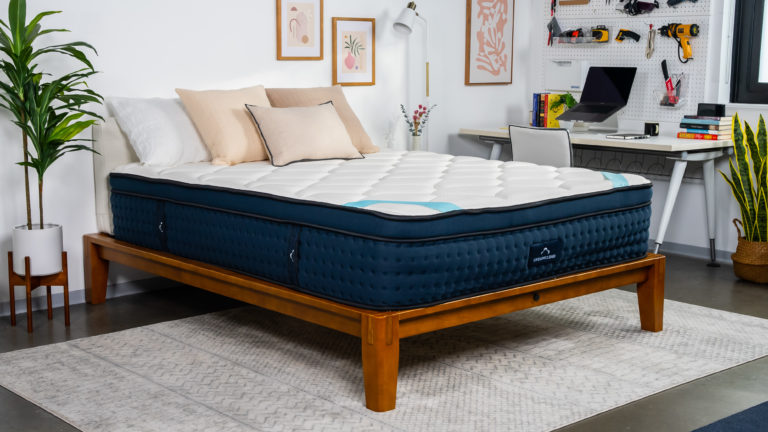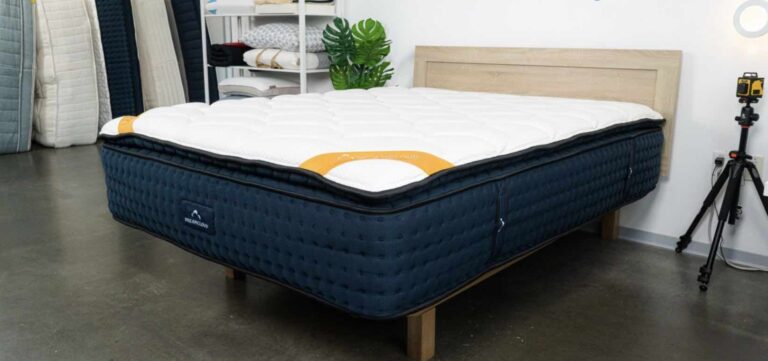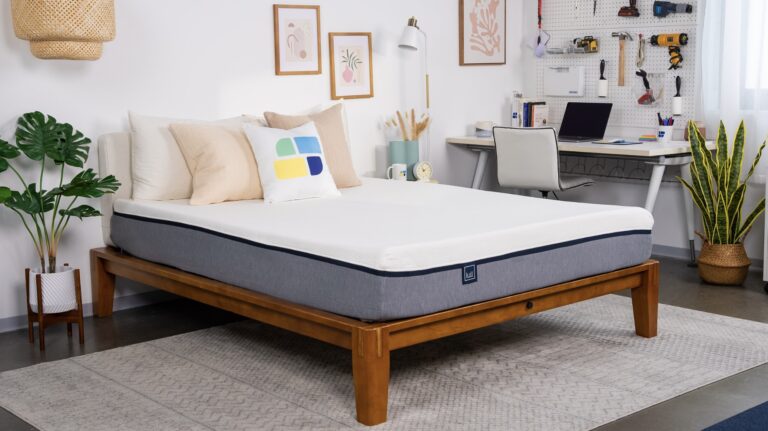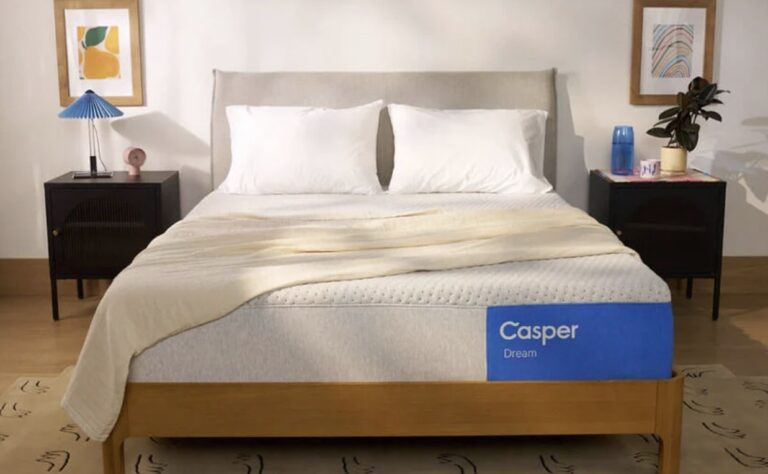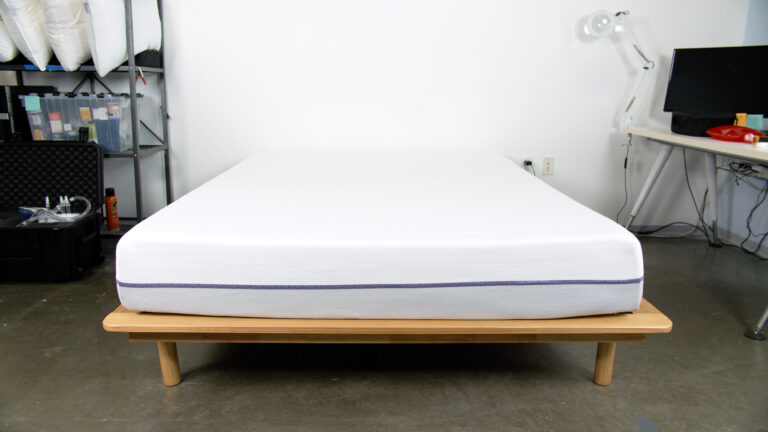When you buy through our links, we may earn a commission. Products or services may be offered by an affiliated entity. Learn more.
Layla Hybrid vs. DreamCloud Mattress Comparison
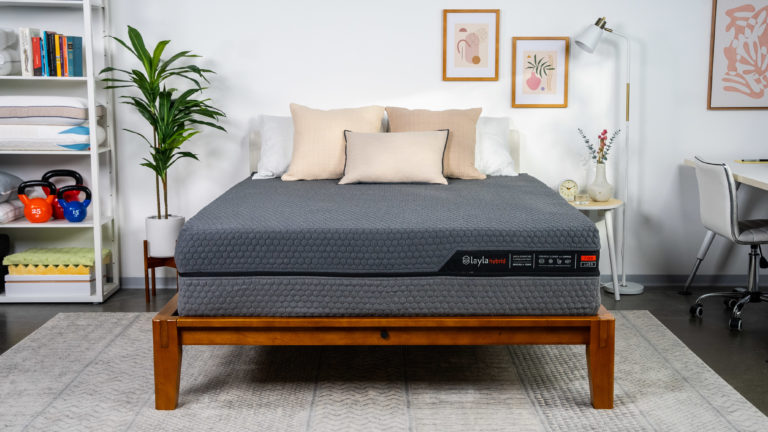
Layla Hybrid
Bottom Line
The flippable Layla Hybrid features a plush, adaptive surface on one side and a very firm feel on the other.
Up to $200 off mattresses + 2 free pillows
Full Mattress ReviewVS
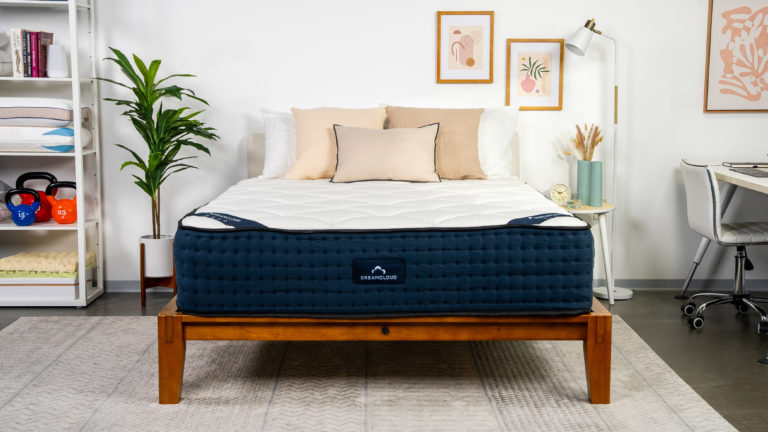
DreamCloud Mattress
Bottom Line
The DreamCloud is both luxurious and affordably priced with a hybrid design that cushions your sore spots and provides excellent support.
Save up to 60% on mattresses
Full Mattress ReviewHybrid mattresses like the Layla Hybrid and DreamCloud Mattress provide a combination of support and cushioning that many sleepers enjoy. With a coil support core and foam comfort layers, these beds usually keep a wide variety of sleepers comfortable. The coil layer also allows airflow to help keep sleepers cool at night.
Both the Layla Hybrid and the DreamCloud Mattress are solid options for sleepers who prefer a hybrid mattress. Choosing between the two may feel difficult for some shoppers, because of their comparable features. That’s why we had our testing team take a close look at both beds.
Our team tried out these mattresses in our testing lab, analyzed each manufacturer’s policies, and read many customer reviews online to get a sense of how these mattresses compare to one another. Check out what we found, so you can decide which is the best mattress for you.
Quick Look
$1,499
$599
Reversible: Medium Soft (4), Firm (7)
Medium Firm (6)
- Reversible construction offers two firmness levels
- Copper-infused memory foam contours without trapping too much heat
- Thick profile with cashmere-blend cover
- Zoned coils minimize sinkage along the mattress edges
- 120 nights
- 10 year, Limited
- 365 nights (30-night requirement)
- Lifetime, limited
- A+
- A+
Our Testing Team’s Take
Our team puts each mattress through rigorous testing in our Seattle-based Test Lab, using our own unique methodology. We’ve tested around 2,000 beds over the past ten years and refined our approach along the way. For each mattress, we use objective measures to assess how well it relieves pressure and disperses heat. We also subjectively analyze how well it provides support and comfort.
In addition to examining mattresses in the Test Lab, a team member takes home each bed to personally try it out in their own bedroom. At-home testing allows us to determine how a mattress performs overnight in a real-world setting. With differing body weights and sleep position preferences, our testers represent a diversity of perspectives, just like our readers. Their unique insights can help different people choose a mattress based on their individual needs and preferences.
Our Verdict
The Layla Hybrid and the DreamCloud Mattress excel in similar areas, but fit different sleeper profiles. These beds are both good at relieving pressure, so sleepers are less likely to experience pressure buildup and pain points. They also do a good job of isolating motion, making them solid options for people who share a bed with a partner.

Brad Nehring
Senior Product Analyst
Side sleeper
215 lbs.
Sleeps with a weighted blanket
“I really like the Layla Hybrid’s design — each side feels distinct and contours to a different extent. As a side sleeper over 200 pounds, I prefer the firmer surface, but I can see how the softer side would be appealing to people who enjoy a deep body hug.”
There are some ways in which the Layla Hybrid and DreamCloud Mattress differ. The DreamCloud comes with a lower price tag, which value shoppers will appreciate. The Layla Hybrid features a flippable design, with one side softer and one side firmer than the DreamCloud Mattress’ medium firm surface. This difference means the beds excel at providing comfort and support to people of differing body weights and sleep position preferences.

Mary Fenton
Head of Product Content
Combo sleeper
150 lbs.
Sleeps with noise machine
“As a combination sleeper, I appreciated the ability to get support from the DreamCloud in different sleeping positions. I liked how even though it offered moderate contouring, I never felt like I was sinking into the mattress.”
Construction and Materials
While these beds share similar materials, their construction differs in evident ways.
| Construction Analysis | Layla Hybrid | DreamCloud Mattress |
|---|---|---|
| Cover | 63% polyester, 26% rayon, 6% viscose, and 5% Lycra spandex with polyurethane handles | Cashmere blend |
| Comfort Layer | Soft Side: 2.5″ memory foam (copper-infused) Firm Side: 1″ memory foam (copper-infused) | 2″ memory foam (gel-infused) |
| Transitional Layer | Soft Side: 2″ polyfoam Firm Side: 1.5″ polyfoam | 1” polyfoam |
| Support Core | 6″ pocketed coils (zoned, reinforced perimeter) | 8″ pocketed coils 0.5″ polyfoam |
Layla Hybrid Breakdown
The medium soft side of the flippable Layla Hybrid rates 4 out of 10 on our mattress firmness scale, and the firm side rates 7 out of 10. The mattress features a 13-inch profile and contains six layers. Its cover is quilted and made of polyester, rayon, viscose, and Lycra spandex. Attached to the sides are polyurethane handles to make lifting the bed easier.
Because the mattress is flippable and sleepers can sleep on either side, there are two comfort systems with transitional layers, one on each side of the bed. On the soft side of the bed, the comfort layer is 2.5 inches of copper-infused memory foam, and the transitional layer is 2 inches of polyfoam. On the firm side, the copper-infused memory foam comfort layer measures 1 inch and the transitional polyfoam layer measures 1.5 inches. Both polyfoam layers contain channels that allow cooling airflow.
Because the Layla Hybrid is flippable, the support core sits in the center of the mattress. Pocketed coils provide support on this bed, and they measure 6 inches in height. The pocketed coils around the mattress’ perimeter are thicker than the rest to help keep the edges of the bed firm beneath a person’s body weight.
DreamCloud Mattress Breakdown
The DreamCloud Mattress is a hybrid too but, unlike the Layla Hybrid, isn’t flippable. That means sleepers use one side of the bed, which rates as medium= firm or 6 out of 10 on our firmness scale. The mattress is 12 inches tall and covered in a cashmere blend fabric. Like the Layla Hybrid, the DreamCloud Mattress has built-in handles to make picking it up easier.
Beneath its cover, the DreamCloud Mattress contains four layers. The uppermost layer measures 2 inches thick and is made of gel memory foam that provides cushioning. Beneath it sits a 1-inch polyfoam transitional layer. These layers are generally firmer to prevent sleepers from sinking too far into the mattress.
The 8-inch support core in the DreamCloud Mattress features pocketed coils designed to move individually, which helps prevent motion from traveling across the surface of the bed. Beneath the coils sits a half-inch layer of polyfoam to help stabilize the coils.
Mattress Sizing and Weight
Both the Layla Hybrid and the DreamCloud Mattress come in twin, twin XL, full, queen, king, and California king sizes. Additionally, the DreamCloud Mattress is available in a split king intended for co-sleepers who share an adjustable bed.
These beds have similar profiles, with the Layla Hybrid measuring 13 inches thick and the DreamCloud Mattress measuring 12 inches thick.
A queen size Layla Hybrid weighs 104 pounds, while a DreamCloud Mattress in the same size weighs 78 pounds. Although the Layla Hybrid weighs more, most people will likely need a second person to help them lift either mattress.
| Mattress Model | Profile | Weight |
|---|---|---|
| Layla Hybrid | 13″ | 104 lbs. |
| DreamCloud Mattress | 12″ | 78 lbs. |
Performance Ratings
Since they are constructed similarly, the Layla Hybrid and DreamCloud Mattress share some characteristics. Both beds have earned high ratings for pressure relief, and this is largely thanks to their memory foam comfort layers. They also isolate motion well, as a result of their thick comfort systems and pocketed coils. That means when one bed partner rolls over or gets in or out of bed, the movement shouldn’t disturb the other person much. Airflow through the coils also helps these mattresses sleep cool.
Due to their different firmness levels, these beds are built to support different types of sleepers. The flippable Layla Hybrid allows sleepers to choose between medium-soft (4) and firm (7) sleeping surfaces, while the DreamCloud Mattress offers a medium firm (6) firmness level.
The DreamCloud Mattress received its highest ratings from back and stomach sleepers weighing less than 130 pounds, along with side sleepers weighing between 130 and 230 pounds. The firm side of the Layla Hybrid was a hit with stomach and back sleepers weighing between 130 and 230 pounds, as well as with all sleepers weighing over 230 pounds. The medium soft side fared better with side sleepers weighing less than 130 pounds.
Mattress Pricing
Hybrid beds often fall in the middle when it comes to mattress pricing. They generally cost more than all-foam models due to their coils and more complex designs, but less than latex mattresses or airbeds with high-tech features.
The prices of hybrid mattresses can span a wide range, depending on the materials they are made of and how they are constructed. In this case, the Layla Hybrid costs about double the price of the DreamCloud Mattress. This difference partly stems from the Layla Hybrid having a higher profile than the DreamCloud Mattress. A higher profile means the bed contains more materials, which increases the cost. The Layla Hybrid is also more complex because of its flippable design.
| Policy | Layla Hybrid | DreamCloud Mattress |
|---|---|---|
| Sleep Trial | 120 nights | 365 nights |
| Warranty | 10 years, limited | Limited, limited |
| Shipping | Free to the contiguous US; for a fee to Alaska, Hawaii, and Canada | Free to the contiguous US; for a fee to Alaska and Hawaii |
| White Glove Delivery | Not available | Available for a fee |
What Customers Are Saying
Customer reviews of both the Layla Hybrid and the DreamCloud Mattress are generally positive. Both beds are often praised for providing pressure relief, but some lighter-weight side sleepers complain that the DreamCloud Mattress is too firm for them. Customers also often describe both beds as successfully keeping sleepers cool.
Before buying either bed, carefully consider which might work best for you given your preferred sleep position, body weight, and budget.

Still have questions? Ask our community!
Join our Sleep Care Community — a trusted hub of product specialists, sleep health professionals, and people just like you. Whether you’re searching for the perfect mattress or need expert sleep advice, we’ve got you covered. Get personalized guidance from the experts who know sleep best.

